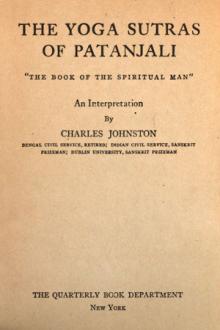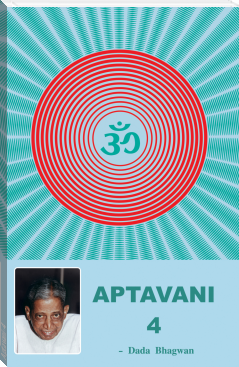The Yoga Sutras of Patanjali - Patañjali (ready to read books txt) 📗

- Author: Patañjali
- Performer: -
Book online «The Yoga Sutras of Patanjali - Patañjali (ready to read books txt) 📗». Author Patañjali
The second part of the second book is concerned with practical spiritual training, that is, with the earlier practical training of the spiritual man.
The most striking thing in it is the emphasis laid on the Commandments, which are precisely those of the latter part of the Decalogue, together with obedience to the Master. Our day and generation is far too prone to fancy that there can be mystical life and growth on some other foundation, on the foundation, for example, of intellectual curiosity or psychical selfishness. In reality, on this latter foundation the life of the spiritual man can never be built; nor, indeed, anything but a psychic counterfeit, a dangerous delusion.
Therefore Patanjali, like every great spiritual teacher, meets the question: What must I do to be saved? with the age-old answer: Keep the Commandments. Only after the disciple can say, These have I kept, can there be the further and finer teaching of the spiritual Rules.
It is, therefore, vital for us to realize that the Yoga system, like every true system of spiritual teaching, rests on this broad and firm foundation of honesty, truth, cleanness, obedience. Without these, there is no salvation; and he who practices these, even though ignorant of spiritual things, is laying up treasure against the time to come.
1. The practices which make for union with the Soul are: fervent aspiration, spiritual reading, and complete obedience to the Master.
The word which I have rendered “fervent aspiration” means primarily “fire”; and, in the Eastern teaching, it means the fire which gives life and light, and at the same time the fire which purifies. We have, therefore, as our first practice, as the first of the means of spiritual growth, that fiery quality of the will which enkindles and illumines, and, at the same time, the steady practice of purification, the burning away of all known impurities. Spiritual reading is so universally accepted and understood, that it needs no comment. The very study of Patanjali’s Sutras is an exercise in spiritual reading, and a very effective one. And so with all other books of the Soul. Obedience to the Master means, that we shall make the will of the Master our will, and shall confirm in all wave to the will of the Divine, setting aside the wills of self, which are but psychic distortions of the one Divine Will. The constant effort to obey in all the ways we know and understand, will reveal new ways and new tasks, the evidence of new growth of the Soul. Nothing will do more for the spiritual man in us than this, for there is no such regenerating power as the awakening spiritual will.
2. Their aim is, to bring soulvision, and to wear away hindrances.
The aim of fervour, spiritual reading and obedience to the Master, is, to bring soulvision, and to wear away hindrances. Or, to use the phrase we have already adopted, the aim of these practices is, to help the spiritual man to open his eyes; to help him also to throw aside the veils and disguises, the enmeshing psychic nets which surround him, tying his hands, as it were, and bandaging his eyes. And this, as all teachers testify, is a long and arduous task, a steady up-hill fight, demanding fine courage and persistent toil. Fervour, the fire of the spiritual will, is, as we said, twofold: it illumines, and so helps the spiritual man to see; and it also burns up the nets and meshes which ensnare the spiritual man. So with the other means, spiritual reading and obedience. Each, in its action, is twofold, wearing away the psychical, and upbuilding the spiritual man.
3. These are the hindrances: the darkness of unwisdom, self-assertion, lust hate, attachment.
Let us try to translate this into terms of the psychical and spiritual man. The darkness of unwisdom is, primarily, the self-absorption of the psychical man, his complete preoccupation with his own hopes and fears, plans and purposes, sensations and desires; so that he fails to see, or refuses to see, that there is a spiritual man; and so doggedly resists all efforts of the spiritual man to cast off his psychic tyrant and set himself free. This is the real darkness; and all those who deny the immortality of the soul, or deny the soul’s existence, and so lay out their lives wholly for the psychical, mortal man and his ambitions, are under this power of darkness. Born of this darkness, this psychic self-absorption, is the dogged conviction that the psychic, personal man has separate, exclusive interests, which he can follow for himself alone; and this conviction, when put into practice in our life, leads to contest with other personalities, and so to hate. This hate, again, makes against the spiritual man, since it hinders the revelation of the high harmony between the spiritual man and his other selves, a harmony to be revealed only through the practice of love, that perfect love which casts out fear.
In like manner, lust is the psychic man’s craving for the stimulus of sensation, the din of which smothers the voice of the spiritual man, as, in Shakespeare’s phrase, the cackling geese would drown the song of the nightingale. And this craving for stimulus is the fruit of weakness, coming from the failure to find strength in the primal life of the spiritual man.
Attachment is but another name for psychic self-absorption; for we are absorbed, not in outward things, but rather in their images within our minds; our inner eyes are fixed on them; our inner desires brood over them; and em we blind ourselves to the presence of the prisoner’ the enmeshed and fettered spiritual man.
4. The darkness of unwisdom is the field of the others. These hindrances may be dormant, or worn thin, or suspended, or expanded.
Here we have really two Sutras in one. The first has been explained already: in the darkness of unwisdom grow the parasites, hate, lust, attachment. They are all outgrowths of the self-absorption of the psychical self.
Next, we are told that these barriers may be either dormant, or suspended, or expanded, or worn thin. Faults which are dormant will be brought out through the pressure of life, or through the pressure of strong aspiration. Thus expanded, they must be fought and conquered, or, as Patanjali quaintly says, they must be worn thin,-as a veil might, or the links of manacles.
5 The darkness of ignorance is: holding that which is unenduring, impure, full of pain, not the Soul, to be eternal, pure, full of joy, the Soul.
This we have really considered already. The psychic man is unenduring, impure, full of pain, not the Soul, not the real Self. The spiritual man is enduring, pure, full of joy, the real Self. The darkness of unwisdom is, therefore, the self-absorption of the psychical, personal man, to the exclusion of the spiritual man. It is the belief, carried into action, that the personal man is the real man, the man for whom we should toil, for whom we should build, for whom we should live. This is that psychical man of whom it is said: he that soweth to the flesh, shall of the flesh reap corruption.
6. Self-assertion comes from thinking of the Seer and the instrument of vision as forming one self.
This is the fundamental idea of the Sankhya philosophy, of which the Yoga is avowedly the practical side. To translate this into our terms, we may say that the Seer is the spiritual man; the instrument of vision is the psychical man, through which the spiritual man gains experience of the outer world. But we turn the servant into the master. We attribute to the psychical man, the personal self, a reality which really belongs to the spiritual man alone; and so, thinking of the quality of the spiritual man as belonging to the psychical, we merge the spiritual man in the psychical; or, as the text says, we think of the two as forming one self.
7. Lust is the resting in the sense of enjoyment.
This has been explained again and again. Sensation, as, for example, the sense of taste, is meant to be the guide to action; in this case, the choice of wholesome food, and the avoidance of poisonous and hurtful things. But if we rest in the sense of taste, as a pleasure in itself; rest, that is, in the psychical side of taste, we fall into gluttony, and live to eat, instead of eating to live. So with the other great organic power, the power of reproduction. This lust comes into being, through resting in the sensation, and looking for pleasure from that.
8. Hate is the resting in the sense of pain.
Pain comes, for the most part, from the strife of personalities, the jarring discords between psychic selves, each of which deems itself supreme. A dwelling on this pain breeds hate, which tears the warring selves yet further asunder, and puts new enmity between them, thus hindering the harmony of the Real, the reconciliation through the Soul.
9. Attachment is the desire toward life, even in the wise, carried forward by its own energy.
The life here desired is the psychic life, the intensely vibrating life of the psychical self. This prevails even in those who have attained much wisdom, so long as it falls short of the wisdom of complete renunciation, complete obedience to each least behest of the spiritual man, and of the Master who guards and aids the spiritual man.
The desire of sensation, the desire of psychic life, reproduces itself, carried on by its own energy and momentum; and hence comes the circle of death and rebirth, death and rebirth, instead of the liberation of the spiritual man.
10. These hindrances, when they have become subtle, are to be removed by a countercurrent.
The darkness of unwisdom is to be removed by the light of wisdom, pursued through fervour, spiritual reading of holy teachings and of life itself, and by obedience to the Master.
Lust is to be removed by pure aspiration of spiritual life, which, bringing true strength and stability, takes away the void of weakness which we try to fill by the stimulus of sensations.
Hate is to be overcome by love. The fear that arises through the sense of separate, warring selves is to be stilled by the realization of the One Self, the one soul in all. This realization is the perfect love that casts out fear.
The hindrances are said to have become subtle when, by initial efforts, they have been located and recognized in the psychic nature.
11. Their active turnings are to be removed by meditation.
Here is, in truth, the whole secret of Yoga, the science of the soul. The active turnings, the strident vibrations, of selfishness, lust and hate are to be stilled by meditation, by letting heart and mind dwell in spiritual life, by lifting up the heart to the strong, silent life above, which rests in the stillness of eternal love, and needs no harsh vibration to convince it of true being.
12. The burden of bondage to sorrow has its root in these hindrances. It will be felt in this life, or in a life not yet manifested.
The burden of bondage to sorrow has its root in the darkness of unwisdom, in selfishness, in lust, in hate, in attachment to sensation. All these are, in the last analysis, absorption in the psychical self; and this means sorrow, because it means the sense of separateness, and this means jarring discord and inevitable death. But the psychical self will breed a new psychical self, in a new birth, and so new sorrows in a life not yet manifest.
13. From this root there grow and





Comments (0)